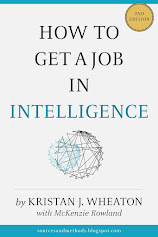Part 1 -- Introduction
Part 2 -- The Intelligence Job Market From 20,000 Feet
Part 3 -- The Good News!
Part 4 -- Even Better News!
Part 5 -- Beyond The Big Three
Part 6 -- Beyond Borders
Part 7 -- Beyond Borders: India, Europe And South Africa
Part 8 -- Going It On Your Own
Part 9 -- The 5 Things You Must Have
A few weeks ago, while I was in the middle of writing this series, I sent a note out to my contacts on LinkedIn looking for some advice on how to get a job in intelligence. I received a number of replies, all of which were very helpful.
Over the next couple of posts, I intend to share many of their insights. In some cases, I have deleted names or generalized positions. In virtually all cases, I have had to edit, unfortunately, for length.
One final note: Some (many, in fact) of the ideas in these responses track closely with my own but some do not. I felt, however, that it was important to include as wide a variety of responses from as many people "actually in the arena" (as Teddy Roosevelt would say) as I could.
Without further ado:
Z. (Government Analyst)
Apply to EVERYTHING, ALWAYS. You don’t know what you’ll like or dislike until you’ve done it for a year (or more), so don’t pigeonhole yourself by only applying to contractors, or only applying to government agencies. Take every interview. More importantly, just because you have an offer and are undergoing the adjudication process does not guarantee employment. Apply to jobs while you’re looking for jobs. Apply to jobs while you have offers for jobs.
Move to DC. I know, I know. “They are plenty of intelligence jobs outside of DC!” I get that. I argue for the big move for two reasons: hiring managers are more likely to bring in a local for an interview than an “outsider” if the qualifications are similar; and, for the most part, the decisionmakers who decide the location where people work usually reside in DC.
When I was looking for a job in the (national security) Intelligence Community (IC) after graduating, I had two options: move back (home), work in an office job while applying for IC jobs and hope someone thought highly enough of me to fly me to DC, put me up in a hotel and maybe rent me a car. Or, I could move to DC, find an office job, use the contacts my classmates who did secure employment in DC cultivated, and take an afternoon off of work to stop in the office and interview in person. In today’s economy, “outsiders” have to be that much more special to earn a flight, room, board, and transportation for an interview.
Lastly, some vacancies state very clearly, “Locals Only” or “DC Metro Area Only” and never see the bright lights of the information superhighway. Websites like USA Jobs, Intelligencecareers.com, Craigslist, et al. may cover 75% of the job openings, but I would argue another 25% come from emails within the IC and word of mouth.
Mike (Government Analyst)
I guess the only advice I have for someone looking for work would be to include all the right "buzz words" on their resume. Be sure to include specifics and detail as well. Probably the most important advice would be to not give up if you don't get your dream job and just apply anywhere and everywhere that offers a security clearance. I would also say to keep looking even after you receive conditional offers because you never know what's going to happen.
Jessica Lamb (Government Contractor Analyst)
I think it's important for aspiring intelligence analysts (IA) to be willing to adapt to different environments. Without already holding a clearance, it may be difficult for an IA to obtain a government or government-contractor job immediately after graduation, so they should be willing to work (in another) position to gain some experience first. Also, they shouldn't underestimate the importance of internships. They should do as many as they can! There's nothing like hands-on intelligence experience to help a new analyst gain insight into the community and ultimately build their resume!
Secondly, it's important for the aspiring IA to willingly learn and use new tools. An analyst who insists on performing research/analysis with a few select tools will likely be overlooked for employees who are more adaptable and learn new techniques more quickly.
Ben (Market Intelligence Analyst)
When you're looking for a job you have to treat the search like your full time job. Keep a record of where you've applied, who the contact person is, and where you're at in the interview process. Also, every time you apply to a job you should tweak your resume slightly to specifically address the requirements in the actual job post. Market intel means different things to different organizations so your resume has to reflect the job post to a certain extent. If you send out one resume for every job you're hurting yourself.
Even if you don't have a lot of experience you still need to link your previous skills and experience directly to the job description. It's important to really think about that before going into the interview. Don't use canned answers from the internet - draw on whatever experience you have and use the terms of the art.
Mike (Business And Market Analyst)
I believe a crucial aspect of securing a job as an analyst is diversifying your skill sets and experiences through a variety of internships. Pursuing and obtaining these internships gave me the experience that employers were looking for in a candidate. I have yet to find an employer whose ideal candidate is a college grad with no work experience. Employers want experience and they want diversified experience. My advice: Take advantage of as many opportunities as possible - paid or volunteer, business or national security, internship or co-op - because regardless if you love it or hate it, it is giving you experience that at the end of the day looks good on your resume and gives you something to talk about in an interview other than a school-related project.
Luke (Job Seeker)
If I had the chance to give a college senior or young grad student seeking employment as an analyst advice I would tell them to only apply to organizations where they can stay passionate about what they're researching. I see a lot of students who (want) to fulfill some misguided Intel career fantasy. These are the students that enroll already set on working for a group like the CIA or FBI. I think these students fail to appreciate the work they are signing themselves up for by applying to these organizations. There are plenty of Intel jobs outside of the US IC. With a little time, effort and research I think that some students are likely to realize that they would be happier working for an organization like the Sierra Club or the World Health Organization rather than a government organization like the CIA or FBI.
For future grads, I would highly recommend that students begin to apply early in the year and apply to as many companies/contracts as possible. Next, you have got to follow up with the HR contacts and any people you meet at job fairs.
From personal experience, my best shot of getting my job was to ask alumni who I knew while I was an undergrad. My bosses are constantly asking us for recommendations for potential employees. (I even passed a resume along after only starting work in June). While this may seem difficult, it never hurts to ask about jobs and people always seem willing to take resumes. Finally, they should try and stay positive. From firsthand experience, this process can be quite stressful. Students should definitely plan for the unpredictable (especially from the government and contractors).
For younger students, the best thing possible is to begin their job search early. Also, I think it really, really, really helps to have an internship which provides the student with a clearance. It makes students WAY more marketable and will give them a better chance against others interviewees who may have more years experience.
Next: More From The Trenches






No comments:
Post a Comment